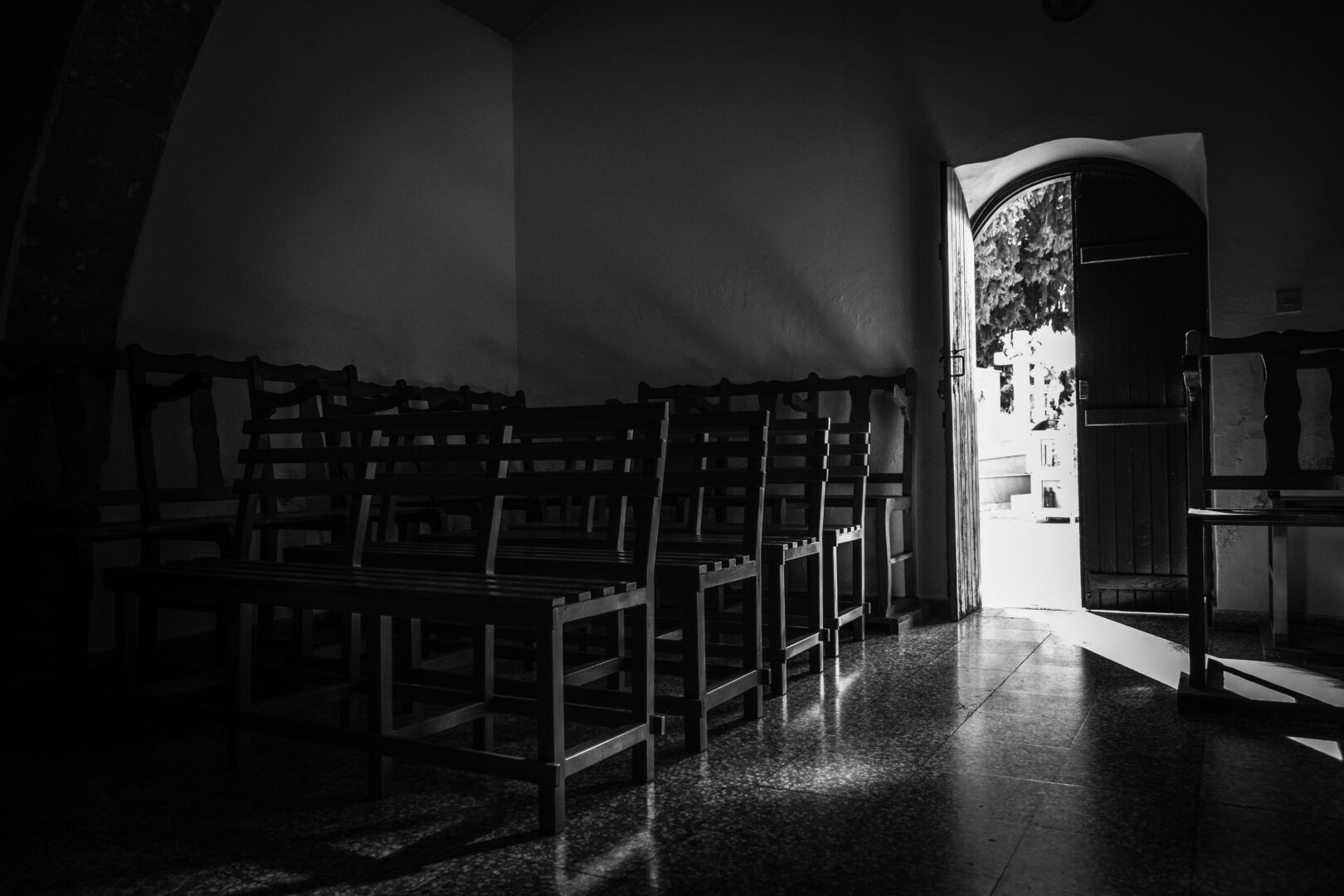Jesus himself came near and went with them. (Lk 24:15)
Then beginning with Moses and all the prophets, he interpreted to them the things about himself in all the scriptures. (Lk 24:27)
Like other peoples, our land, history, worship and mission are always threatened by the dangers of voraciousness, division and pride. Through the gift of Christ’s healing and redemption, we must take stock of the new threats to our cultural fabric and seek to (re)build one home and story, marked by the desire for transcendence.
Through keeping her gaze fixed upon Christ, the True Teacher, the Church learns the attitudes that allow our culture to become more authentically human.
Four pastoral attitudes from the narrative of Emmaus challenge us to learn how to be a People of contemplation, reconciliation, formation and mission in these times:
Pope Francis stresses the importance of a Church that listens. First and foremost, “We need to be constantly trained in hearing the Word,” (Evangelii gaudium, 174) in order to become God’s Holy Assembly.

“In the beginning was the Word, and the Word was with God,
and the Word was God. He was in the beginning with God.
All things came into being through him, and without him not one thing came into being.
What has come into being in him was life, and the life was the light of all people.
The light shines in the darkness, and the darkness did not overcome it.
He was in the world, and the world came into being through him; yet the world did not know him.
He came to what was his own, and his own people did not accept him.
But to all who received him, who believed in his name, he gave power to become children of God,
who were born, not of blood or of the will of the flesh or of the will of man, but of God.
And the Word became flesh and lived among us,
and we have seen his glory, the glory as of a father’s only son, full of grace and truth.
From his fullness we have all received, grace upon grace.
The law indeed was given through Moses; grace and truth came through Jesus Christ.
No one has ever seen God. It is God the only Son, who is close to the Father’s heart, who has made him known.” (Jn 1:1‑5, 10‑14, 16‑18)
“Listening” is how we become attuned to God who speaks to us, his People, in salvation history. First, he spoke “through the prophets,” anointed to be his messengers; but in the end times, He sent his only Son, the Word made flesh, to dwell among us. His Spirit of Truth, who remains in the world, continues to witness to Christ and to comfort his Church.
In the Scriptures, we listen to God’s words echoing in the history of the world and in the heart of all those who desire to “become of God;” to “come to know him” as He has made us first. Without pondering the Word of God in the Scriptures; without being formed to be Christ‑like through encountering him in the concrete stories of the Gospel, our ears remain deaf; our eyes remain closed; our hearts hardened, to the grace that God desires to pour upon us. Without the living Word of God, we shrivel and die.
But “their hearts were burning inside” as the Risen Lord broke open the Scriptures to the disciples of Emmaus. The Scriptures soften our hardness of heart, opening us up to the Other and to all others whom God has loved from the beginning.
In the encounter with the Word, our hearts expand and overflow. Creating space for the other to be “other” in our lives is about “taking in” and walking in their own shoes, as the Risen Lord walked with his disheartened disciples. The Christian, by virtue of being the disciple of the Word‑made‑flesh, is formed to be truly attentive to the other and, therefore, to “listen” to them.
“We need to practise the art of listening, which is more than simply hearing. Listening, in communication, is an openness of heart which makes possible that closeness without which genuine spiritual encounter cannot occur. Listening helps us to find the right gesture and word which shows that we are more than simply bystanders” (Evangelii gaudium, 171).
Listening is an attitude where one puts their whole self at the disposition of the other; where all one’s energy and attentiveness are given to the other. It is opening up the space within oneself where the other is truly safe, knows that he or she is seen for who they are, and, therefore, feel cherished.
A Church that listens is a bonded People because they have created a shared space to know one another: “I know my own and my own know me, just as the Father knows me and I know the Father” (Jn 10:14b‑15a). But the Church who listens across divisions—especially with those who might see themselves outside the sheepfold—also practices what Christ demanded of his friends: “I have other sheep that do not belong to this fold. I must bring them also, and they will listen to my voice. So there will be one flock, one shepherd” (Jn 10:16).
Building bridges through dialogue reconstitutes an ecclesia measured not by badges of belonging, but by the desire for a shared spirit of friendship and collaboration. The fruit of an ecclesial listening attitude is to grow in our common prayer, that invites us to deeper discernment and contemplation.
In the Emmaus narrative, Christ “opened the eyes” of the disciples when they were willing to “break out” of their cocoon of sorrow and see the “other.” The attitude of “welcome” is about turning one’s gaze out of oneself—even if the very recognition of “otherness” makes one appreciate how much “they” are like oneself. The moment one risks breaking open one’s enclave and walk out the door to relationship, one also discovers their true self. The fruit of an ecclesial welcoming attitude is true reconciliation.

Thus, Pope Francis writes, “The Church must be a place of mercy freely given, where everyone can feel welcomed, loved, forgiven and encouraged to live the good life of the Gospel” (Evangelii gaudium, 114).
A people willing to welcome others grows to be more confident of their unique gifts—and, paradoxically, in and through the very acts of offering them. Through concrete gestures of welcome that reveal our desire to extend friendship to the religious other, to the non‑Maltese other, or even to the brother or sister that past hurts, pika, or merely different outlooks and opinions have taught us to mistrust, the Maltese Church becomes like “bread that is broken” to rediscover her original calling remembered in Acts 28: that of sharing the good news through serving all, no matter their background.
Becoming one “Maltese” people through our differences is a continual process of mutual growth that always implies suffering. Nature always craves equilibrium—even when that equilibrium perpetuates systemic sin and dysfunctional structures that control cycles of violence rather than resolve them. To heal long term prejudice—that “structures of sin” may become stable “structures of blessing”—demands going through difficult periods of purgation. Accompaniment is about this willingness to suffer together for the betterment of another. It is about forcing the storm without which there can be no promise of lasting peace.

A Church that accompanies re‑enacts the sacrifice of the cross, where the innocent victim broke through the impasse of death by allowing darkness to fall on earth. For it was by descending to the deepest darkness that the Son of man would free Adam and all humankind from Hades. As Jesus himself says, “I came to bring fire to the earth, and how I wish it were already kindled! I have a baptism with which to be baptized, and what stress I am under until it is completed!” (Lk 12:49‑50).
Accompaniment is the courage to walk with another through the perilous but necessary path of death and rebirth. In the early Church, it was lived in the adult catechumenate, where the catechist, sustained by the whole community, personally imitated Christ the Pedagogue, by accompanying the catechumen’s passage of dying to oneself to rise with Christ at baptism. It was also lived in repeated communal gestures of penance and purgation that marked the Church’s desire for ongoing purification.
“The Church will have to initiate everyone—priests, religious and laity—into this ‘art of accompaniment’ that teaches us to remove our sandals before the sacred ground of the other
(cf. Ex 3:5). The pace of the accompaniment must be steady and reassuring, reflecting our closeness and our compassionate gaze which also heals, liberates and encourages growth in the Christian life” (Evangelii gaudium, 169). This is what the Church is called to offer people, with sensitivity and full respect. “Without detracting from the evangelical ideal, we need to accompany with mercy and patience the eventual stages of personal growth as these progressively occur” (Evangelii gaudium, 44).That journey from the cross to the resurrection, from death to rebirth, from old life to new life, continues to characterise the Christian life in its praxes for life‑long formation and in the sacraments, in particular the “source and summit” of the Christian life, the Eucharist.
Until the last days, the Church’s mission of preaching the Good News of salvation and of actuating it through the willingness to welcome, listen and accompany, remains ongoing. As Pope Francis exhorts: “I dream of a ‘missionary option’, that is, a missionary impulse capable of transforming everything, so that the Church’s customs, ways of doing things, times and schedules, language and structures can be suitably channelled for the evangelisation of today’s world rather than for her self‑preservation” (Evangelii gaudium, 27).

It also takes missionary disciples to the ends of the earth (Mk 16: 15; Acts 1: 8): for it is in the forgotten peripheries, in the most unseen places of suffering, that Christ chooses to encounter first. The Church’s “option for the poor” echoes Jesus’ own ministry: “Those who are well have no need of a physician, but those who are sick; I have come to call not the righteous but sinners” (Mk 2:17). Thus, as Pope Francis insists, it is from the peripheries that the Church is enriched and strengthened. The poor are the Church’s blood because theirs is the deepest faith.
The People of God in Malta must seek and reach out to the new peripheries in our context.
It is this attitude of going forth that helps the Church venture in the peripheries or in new socio‑cultural environments, to seek those who are distant, and to be ever ready “to abandon the complacent attitude that says: ‘We have always done it this way’” (Evangelii gaudium, 33).
Perhaps our peripheries are literally encroaching on our shores, as they have throughout our history. Or perhaps they are emerging right in our midst, in our very neighbours, that through our busyness, our mad pursuit to riches, status or latest lifestyle fads, we no longer quite see. In the unseen, the “disposables” of a technocratic economy and human vainglory, the Maltese Church is sent forth.


